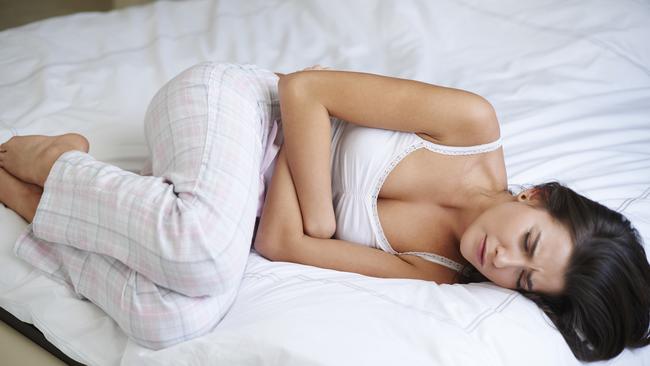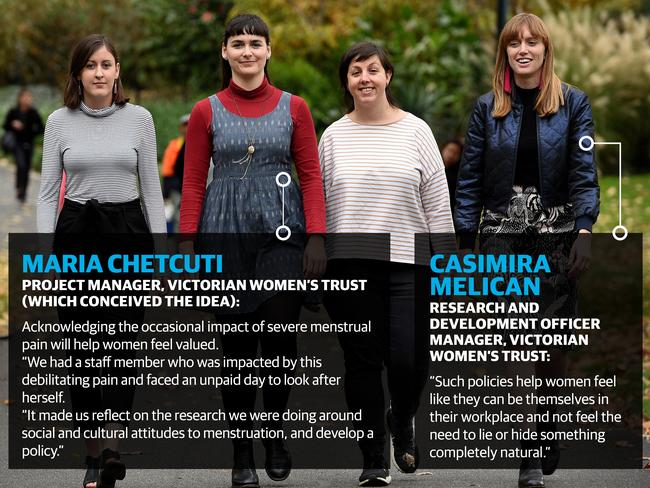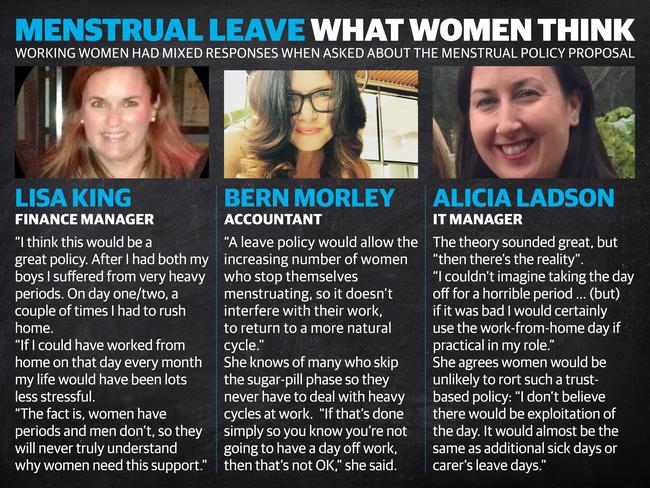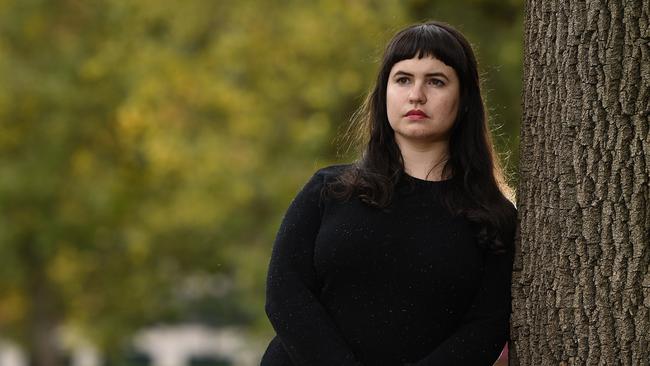Women call on employers to allow period leave
WOMEN with severe menstrual pain should get up to 12 days a year on paid leave or the flexibility to work from home, according to the Victorian Women’s Trust.

VIC News
Don't miss out on the headlines from VIC News. Followed categories will be added to My News.
EMPLOYERS should allow women with serious menstrual pain to have up to 12 days a year on paid leave or to work at home a day a month if they suffer severe cramps, according to the Victorian Women’s Trust.
After what is believed to be the largest survey of Australian women about the impact of strong pain one day a month, the philanthropic body says productivity would benefit from introducing “menstrual policies”.
The trust surveyed more than 3500 women about what was needed to help manage work during strong pain and “the vast majority” said being allowed to work from home or in a more comfortable position in their workplace would be beneficial.
Women’s health: Unhealthy habits driving up disease
Trust CEO Mary Crooks said menstrual policies in workplaces would not be exploited and would enhance employer-employee relationships by supporting women with strong pain and recognising it was not “a sickness”.
She said it was young women working for the trust who generated the survey and policy proposal.


“It doesn’t have to mean taking leave from work ... women could work from home or go to a different part of the office where your body could relax a bit and take your laptop with you,” Ms Crooks said. “You could take a day’s paid leave if the pain was too great.
At the moment women feel forced to mask menstrual pain because of this 19th-century stigma attached to it.”
Japan has offered menstrual leave policies for decades and this month Italy became the first European country to have introduced menstrual workplace policies.
She said the policy could potentially mean women were entitled to 12 extra days of paid leave on top of existing sick leave provisions.
Taking one day would not require a medical certificate.
A backlash against the proposal is expected but Ms Crooks said: “I think that is useful for us in terms of understanding the attitudes that need to be contended with if we want to move on and be genuinely respectful and reach gender parity.”
She said adopting menstrual policies would be “a very mature and contemporary thing for employers to do”.
Women’s health specialist, obstetrician and gynaecologist Associate Professor Kate Stern, said debilitating period pain does exist and can even require medical intervention.
“Really bad pain, or primary dysmenorrhoea, is pain that affects your concentration but (the impact of it) is different to different people,” she said. Dr Stern said very strong period pain is “a common presentation to a GP or a gynaecology clinic” but only a very small number of women have uncontrollable pain.
“It’s highly unlikely any woman would claim the 12 days; my hunch you would be more likely to see women take up the ability to rest up a bit in your place of work and change your working conditions to be in a more restful pose (such as with legs stretched out).”
Debilitating symptoms sometimes associated with menopause would also be covered under such policies and the trust has drafted a template for it.
‘Like a big punch in the guts’

PAIN burst in to Tahlia Celenn’s life when she was just 14 and started having her monthly cycle. For the next decade and beyond, it wreaked havoc on her life.
“I couldn’t walk or bend out of pain, I was vomiting, dizzy and faint, and if I tried to move, I was just screaming,” she said of the first days of her cycle.
On the worst days, she couldn’t hold down food because the pain was so great.
She required many stays in hospital of up to five days at a time.
Regular painkillers did not touch the pain, and as soon as the powerful drug Endone wore off, “it came back, bam, like a big punch in the guts”.
She was working fulltime in an IT customer support role in Melbourne and her employer was not happy with the number of days she was forced to take off. She amassed 31 sick days in just 17 months.
“I was told by doctors: ‘We don’t know what’s wrong with you, go home’,” she says of her efforts to find a cause and solution. She was booked in for a laparoscopy in 2016 and had an eight-month wait.
“In the meantime, my employer called me in and said ‘you have taken 31 sick days, you are only entitled to 10; we are not going to punish you but from now on they will either come out of your leave or (if you have none owing) you don’t get paid’.”
Ms Celenn, now 27, said if her employer had understood that sometimes she needed to work from home, which was possible in her role, it would have made the world of difference: “When you’re working at home, you’re still working, just in a more comfortable position.”
Like one in 10 Victorian women, Ms Celenn was diagnosed as being “riddled with” endometriosis after the laparoscopy.


